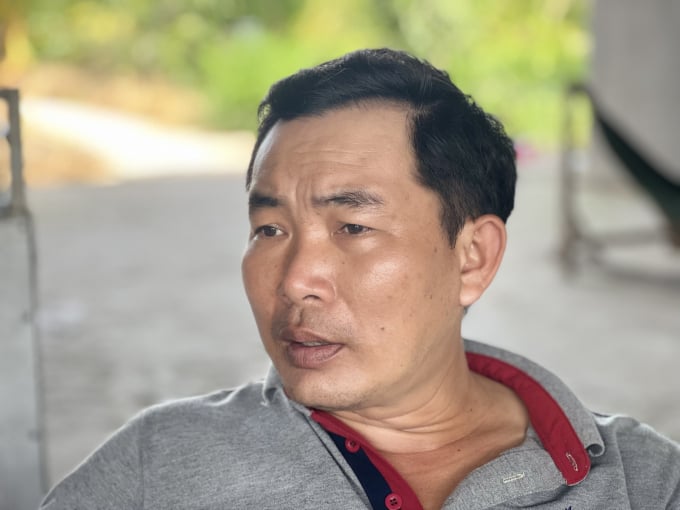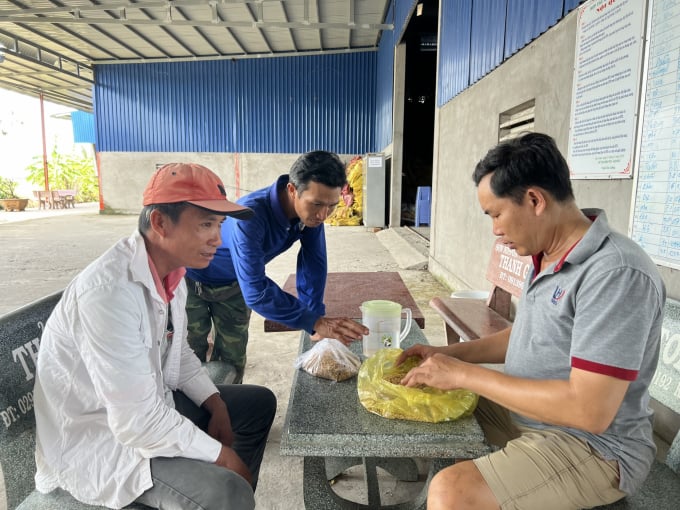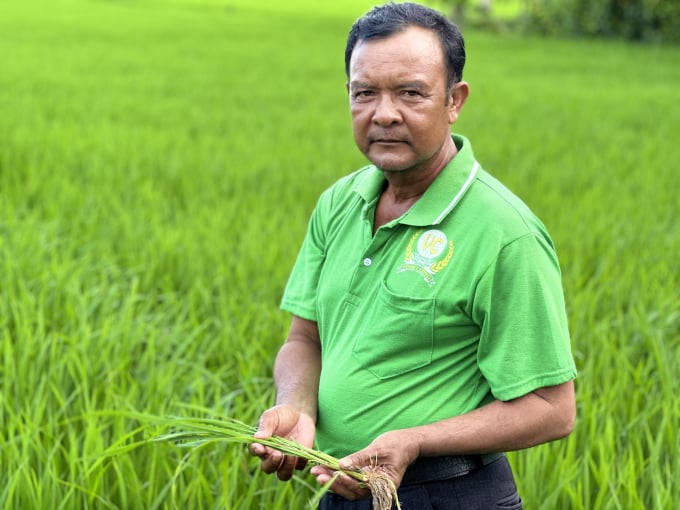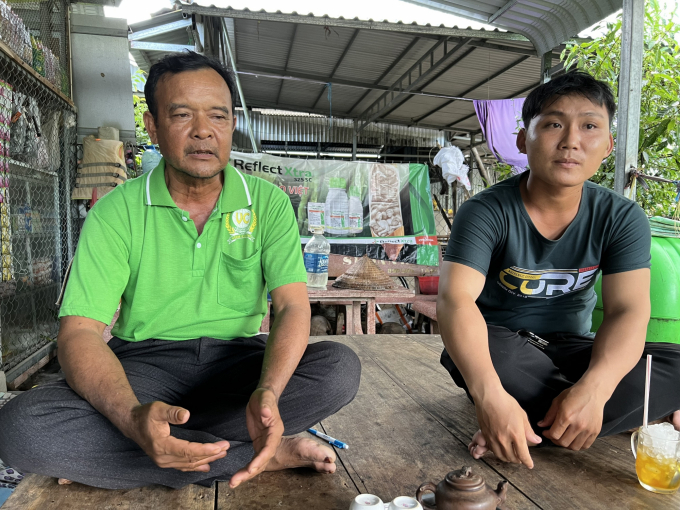May 17, 2025 | 14:56 GMT +7
May 17, 2025 | 14:56 GMT +7
Hotline: 0913.378.918
May 17, 2025 | 14:56 GMT +7
Hotline: 0913.378.918
National Highway 1A at the end of Bac Lieu province going down to Ca Mau has divided Hoa Binh district into two distinct ecological zones. One side is an area for aquaculture and renewable energy projects, the other is a rice-specialized area with an area of approximately 11,000 ha, concentrated in the communes of Vinh Binh, Minh Dieu, Vinh My B and Hoa Binh town.
In recent years, the people of this land used to call it the Vinh Cuong field - the name of the largest agricultural cooperative in Bac Lieu province. Not only because more than 70% of the rice growing area in the district is owned by the cooperative but also because Vinh Cuong has been a bridge to bring rice in Bac Lieu's hometown to all 34 countries around the world for many years.

Mr. Trinh Van Cuong, Chairman of the Board of Directors and Director of Vinh Cuong Agricultural Cooperative. Photo: Trong Linh.
Chairman of the Board of Directors and Director of Vinh Cuong Agricultural Cooperative Trinh Van Cuong welcomed me with very simple and casual clothing. He gives out a presence very different from a colleague’s story of a “giant” who earns tens of billions of VND a year from the field.
And so, the cooperative economy story of "the person with the most fields in Bac Lieu" began by sharing a simple principle of cooperation: If we can solve the existing problems to minimize input costs and minimize output benefits, the people will surely follow.
Vinh Cuong Agricultural Cooperative was established in 2016. Before that, "Boss Cuong" was inherently the owner of a rice trading agent - a stage in the traditional rice chain in the delta. He also hired nearly 150 ha of fields in An Giang and laborers to grow rice. If there was a good harvest that year, he could earn tens of billions of VND as easy as pie. He didn’t have to worry about putting food on the table, but something kept weighing his mind: “The homeland’s countryside is so vast and rich, but why the life of rice farmers couldn’t get any better?”
After a few months of study, and a crop monitoring the farming practices of the people, the rice trader understood the "essence of the problem": Every one of them produces rice in a “freestyle” manner. From seedlings, fertilizer and pesticides to all other inputs, they would buy what the business agents induced them to use. They didn’t even know how expensive it was or whether the quality was good or bad, so the input costs were greatly increased.
The same goes for the output. Producing some rice grains was hard already, but the people often didn't know who to sell to. They suffered the “good crop - bad price” situation, or get tangled with a "middleman". Purchasing merchants would regularly force down the price, and farmers were the ones to bear the consequences.
“So I thought, if we can gather the people to enter the cooperative, having ‘same input, same output’, aiming to the key purpose of sharing as the true nature of a cooperative, this problem could be resolved.”
Of course, easier said than done. Like many other agricultural cooperatives, Vinh Cuong's only had 30 members on its founding date. He kept encouraging, but no one cared to ever enter, because they saw nothing, and believed nothing. Director Cuong had foreseen this in advance and began to convince with a service he considered “the most ridiculous” rice farmers in Bac Lieu had to endure.
“The paddy fields were of the people, so the rice also belonged to the people. The rice purchasing agent only bought, filtered and then resold it for VND 16,000 - 17,000/kg, while the market price was only approximately VND 9,000.
“Vinh Cuong Cooperative also followed the same process. The only difference was that the cooperative provide support to farmers at a price of VND 10,000/kg, along with that was a commitment to ensuring quality and only collecting money at the end of the crop. This was a really effective method. After only one crop, people rushed to join the cooperative, at one time there were more than 450 members, and in the next season it increased to 3,965 associate members," said Director Cuong.

The philosophy of Vinh Cuong Agricultural Cooperative: All to share benefits with farmers. Photo: Trong Linh.
The story after that was much easier. When people believed in the benefits of collective economy and Vinh Cuong Cooperative had had the advantage of scale with thousands of member households, the control of input to reduce the production cost turned out to be simple.
Although it was not a profit-sharing cooperative model, “every farmer wanted to come to Vinh Cuong" because of its commitment to never lose money thanks to the output underwriting and consumption policies.
Not only large in area and the number of members, what made Vinh Cuong's difference was probably market linkage. There was hardly a cooperative that annually underwrote more than 20,000 ha of rice, sold more than 250,000 tons of rice to exporting enterprises, and earned hundreds of billions of dong.
Of course the production procedure must also be thoroughly organized. Vinh Cuong's apparatus has five people on the board of directors, seven production teams and fourteen technical staff, most of which are technician-level. After signing the contract and supplying inputs to the farmers, the entire production procedure, technical guidance on farming, crop protection and care were closely monitored by a technician team.

Mr. Ly Van Tuong, Head of An Thanh hamlet. Photo: Trong Linh.
Success with the rice linkage chain in Bac Lieu, Vinh Cuong was given a new mission by Bac Lieu province and Hoa Binh district: accompany eight neighboring agricultural cooperatives to expand the economic scale of cooperative.
Like Chairman of Hoa Binh District People's Committee Ho Van Linh said, it would be a very powerful transformation because people had clearly seen the benefits of joining a cooperative.
Farming in An Thanh from the past up to now normally had more advantages than other lands from convenient irrigation systems, intra-field traffic to reasonable wages and low production costs. On average, each household in An Thanh in particular and in Vinh My B in general had 8-10 ha of fields. After working on a crop and calculating the expense, the investment cost of each crop was approximately VND 15 million/ha. The average rice yield could reach 6 tons. Without any incident occurred, the profit could be up to VND 25-30 million/ha.
But just like the "generations-long problem" of individual economy, the biggest "bottleneck" of the people, in addition to the problem of "input and output", was the limitation in knowledge and farming techniques.
Having such a vast field, but each household farmed using their own way, no one was the same. Pollution, and pests also came from that. Whenever they saw pests, they spray pesticides indiscriminately, which was both costly and ineffective.
“There were crops when the input costs became too high, but the rice produced had no place to sell to. The price was often forced to be as low as possible by middlemen and traders. But since joining the cooperative, we no longer have to worry about these problems,” said the head of An Thanh hamlet.

More and more people are applying to associate with Vinh Cuong Agricultural Cooperative. Photo: Trong Linh.
Mr. Ly Van Tuong‘s family also has 5 ha of fields associated with Vinh Cuong Cooperative, producing 3 crops a year. "Basically the cooperative's services are already taken care of production. I only visit the fields occasionally. If the rice is infected with pests and diseases, I just need to pick up the phone and call the cooperative to notify so they can assign a technician to come down to inspect the rice and provide guidance for prevention.”
“The best thing is selling rice. After the cutting machine is finished and the balance has completed the measurement, we can receive the money right away. The cooperative is ready to purchase as much rice as we produce, and the price is at least equal to and higher than the outside market price of VND 1,000 - 2,000/bushel of rice (approximately 20 kg).”
Having a 5 ha field is enough for Mr. Tuong to make a profit of more than VND 100 million per crop while farming in this “leisured” manner.
Translated by Samuel Pham
/2025/05/16/3923-2-171845_52.jpg)
(VAN) Lower costs, higher yields, and improved soil quality are outstanding benefits that soybeans bring when integrated into the crop rotation system.

(VAN) The 'For a Green National Environment' programme aims to promote a green lifestyle, support businesses in implementing ESG practices, and turn Net Zero commitments into concrete actions.

(VAN) Cold-barn systems efficiently manage environmental and temperature conditions, which aids in the prevention of respiratory diseases in pigs and protects them from the vectors that transmit African swine fevers.

(VAN) To tackle challenges, the project 'Addressing key technical bottlenecks in the grouper supply chain in Vietnam' has been underway since 2024.

(VAN) The project 'Disease-Resilient and Sustainable Cassava Production Systems in the Mekong Region', funded by the Australian Center for International Agricultural Research (ACIAR), is being implemented from 2024 to 2028.

(VAN) Data from 10,000 farming households will help professionalize production organization and support the implementation of the One Million Hectares Program for High-Quality, Low-Emission Rice Cultivation.

(VAN) FAO Director-General QU Dongyu marks International Day of Plant Health at NENA conference.